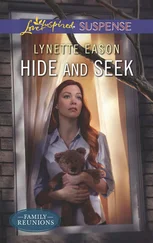Уилки Коллинз - Hide and Seek
Здесь есть возможность читать онлайн «Уилки Коллинз - Hide and Seek» весь текст электронной книги совершенно бесплатно (целиком полную версию без сокращений). В некоторых случаях можно слушать аудио, скачать через торрент в формате fb2 и присутствует краткое содержание. Год выпуска: 2005, Жанр: Классическая проза, на английском языке. Описание произведения, (предисловие) а так же отзывы посетителей доступны на портале библиотеки ЛибКат.
- Название:Hide and Seek
- Автор:
- Жанр:
- Год:2005
- ISBN:нет данных
- Рейтинг книги:5 / 5. Голосов: 1
-
Избранное:Добавить в избранное
- Отзывы:
-
Ваша оценка:
- 100
- 1
- 2
- 3
- 4
- 5
Hide and Seek: краткое содержание, описание и аннотация
Предлагаем к чтению аннотацию, описание, краткое содержание или предисловие (зависит от того, что написал сам автор книги «Hide and Seek»). Если вы не нашли необходимую информацию о книге — напишите в комментариях, мы постараемся отыскать её.
Hide and Seek — читать онлайн бесплатно полную книгу (весь текст) целиком
Ниже представлен текст книги, разбитый по страницам. Система сохранения места последней прочитанной страницы, позволяет с удобством читать онлайн бесплатно книгу «Hide and Seek», без необходимости каждый раз заново искать на чём Вы остановились. Поставьте закладку, и сможете в любой момент перейти на страницу, на которой закончили чтение.
Интервал:
Закладка:
But what avails the voice of lamentation? What new neighborhood ever stopped on its way into the country, to hearken to the passive remonstrance of the fields, or to bow to the indignation of outraged admirers of the picturesque? Never was suburb more impervious to any faint influences of this sort, than that especial suburb which grew up between Baregrove Square and the country; removing a walk among the hedge-rows a mile off from the resident families, with a ruthless rapidity at which sufferers on all sides stared aghast. First stories were built, and mortgaged by the enterprising proprietors to get money enough to go on with the second; old speculators failed and were succeeded by new; foundations sank from bad digging; walls were blown down in high winds from hasty building; bricks were called for in such quantities, and seized on in such haste, half-baked from the kilns, that they set the carts on fire, and had to be cooled in pails of water before they could be erected into walls—and still the new suburb defied all accidents, and grew irrepressibly into a little town of houses, ready to be let and lived in, from the one end to the other.
The new neighborhood offered house-accommodation—accepted at the higher prices as yet only to a small extent—to three distinct subdivisions of the great middle class of our British population. Rents and premises were adapted, in a steeply descending scale, to the means of the middle classes with large incomes, of the middle classes with moderate incomes, and of the middle classes with small incomes. The abodes for the large incomes were called “mansions,” and were fortified strongly against the rest of the suburb by being all built in one wide row, shut in at either end by ornamental gates, and called a “park.” The unspeakable desolation of aspect common to the whole suburb, was in a high state of perfection in this part of it. Irreverent street noises fainted dead away on the threshold of the ornamental gates, at the sight of the hermit lodge-keeper. The cry of the costermonger and the screech of the vagabond London boy were banished out of hearing. Even the regular tradesman’s time-honored business noises at customers’ doors, seemed as if they ought to have been relinquished here. The frantic falsetto of the milkman, the crash of the furious butcher’s cart over the never-to-be pulverized stones of the new road through the “park,” always sounded profanely to the passing stranger, in the spick-and-span stillness of this Paradise of the large incomes.
The hapless small incomes had the very worst end of the whole locality entirely to themselves, and absorbed all the noises and nuisances, just as the large incomes absorbed all the tranquillities and luxuries of suburban existence. Here were the dreary limits at which architectural invention stopped in despair. Each house in this poor man’s purgatory was, indeed, and in awful literalness, a brick box with a slate top to it. Every hole drilled in these boxes, whether door-hole or window-hole, was always overflowing with children. They often mustered by forties and fifties in one street, and were the great pervading feature of the quarter. In the world of the large incomes, young life sprang up like a garden fountain, artificially playing only at stated periods in the sunshine. In the world of the small incomes, young life flowed out turbulently into the street, like an exhaustless kennel-deluge, in all weathers. Next to the children of the inhabitants, in visible numerical importance, came the shirts and petticoats, and miscellaneous linen of the inhabitants; fluttering out to dry publicly on certain days of the week, and enlivening the treeless little gardens where they hung, with lightsome avenues of pinafores, and solemn-spreading foliage of stout Welsh flannel. Here that absorbing passion for oranges (especially active when the fruit is half ripe, and the weather is bitter cold), which distinguishes the city English girl of the lower orders, flourished in its finest development; and here, also, the poisonous fumes of the holyday shop-boy’s bad cigar told all resident nostrils when it was Sunday, as plainly as the church bells could tell it to all resident ears. The one permanent rarity in this neighborhood, on week days, was to discover a male inhabitant in any part of it, between the hours of nine in the morning and six in the evening; the one sorrowful sight which never varied, was to see that every woman, even to the youngest, looked more or less unhappy, often care-stricken, while youth was still in the first bud; oftener child-stricken before maturity was yet in the full bloom.
As for the great central portion of the suburb—or, in other words, the locality of the moderate incomes—it reflected exactly the lives of those who inhabited it, by presenting no distinctive character of its own at all.
In one part, the better order of houses imitated as pompously as they could, the architectural grandeur of the mansions owned by the large incomes; in another, the worst order of houses respectably, but narrowly, escaped a general resemblance to the brick boxes of the small incomes. In some places, the “park” influences vindicated their existence superbly in the persons of isolated ladies who, not having a carriage to go out in for an airing, exhibited the next best thing, a footman to walk behind them: and so got a pedestrian airing genteelly in that way. In other places, the obtrusive spirit of the brick boxes rode about, thinly disguised, in children’s carriages, drawn by nursery-maids; or fluttered aloft, delicately discernible at angles of view, in the shape of a lace pocket-handkerchief or a fine-worked chemisette, drying modestly at home in retired corners of back gardens. Generally, however, the hostile influences of the large incomes and the small mingled together on the neutral ground of the moderate incomes; turning it into the dullest, the dreariest, the most oppressively conventional division of the whole suburb. It was just that sort of place where the thoughtful man looking about him mournfully at the locality, and physiologically observing the inhabitants, would be prone to stop suddenly, and ask himself one plain, but terrible question: “Do these people ever manage to get any real enjoyment out of their lives, from one year’s end to another?”
To the looker-on at the system of life prevailing among the moderate incomes in England, the sort of existence which that system embodies seems in some aspects to be without a parallel in any other part of the civilized world. Is it not obviously true that, while the upper classes and the lower classes of English society have each their own characteristic recreations for leisure hours, adapted equally to their means and to their tastes, the middle classes, in general, have (to expose the sad reality) nothing of the sort? To take an example from those eating and drinking recreations which absorb so large a portion of existence:—If the rich proprietors of the “mansions” in the “park” could give their grand dinners, and be as prodigal as they pleased with their first-rate champagne, and their rare gastronomic delicacies; the poor tenants of the brick boxes could just as easily enjoy their tea-garden conversazione, and be just as happily and hospitably prodigal, in turn, with their porter-pot, their teapot, their plate of bread-and-butter, and their dish of shrimps. On either side, these representatives of two pecuniary extremes in society, looked for what recreations they wanted with their own eyes, pursued those recreations within their own limits, and enjoyed themselves unreservedly in consequence. Not so with the moderate incomes: they, in their social moments, shrank absurdly far from the poor people’s porter and shrimps; crawled contemptibly near to the rich people’s rare wines and luxurious dishes; exposed their poverty in imitation by chemical champagne from second-rate wine merchants, by flabby salads and fetid oyster-patties from second-rate pastry-cooks; were, in no one of their festive arrangements, true to their incomes, to their order, or to themselves; and, in very truth, for all these reasons and many more, got no real enjoyment out of their lives, from one year’s end to another.
Читать дальшеИнтервал:
Закладка:
Похожие книги на «Hide and Seek»
Представляем Вашему вниманию похожие книги на «Hide and Seek» списком для выбора. Мы отобрали схожую по названию и смыслу литературу в надежде предоставить читателям больше вариантов отыскать новые, интересные, ещё непрочитанные произведения.
Обсуждение, отзывы о книге «Hide and Seek» и просто собственные мнения читателей. Оставьте ваши комментарии, напишите, что Вы думаете о произведении, его смысле или главных героях. Укажите что конкретно понравилось, а что нет, и почему Вы так считаете.











